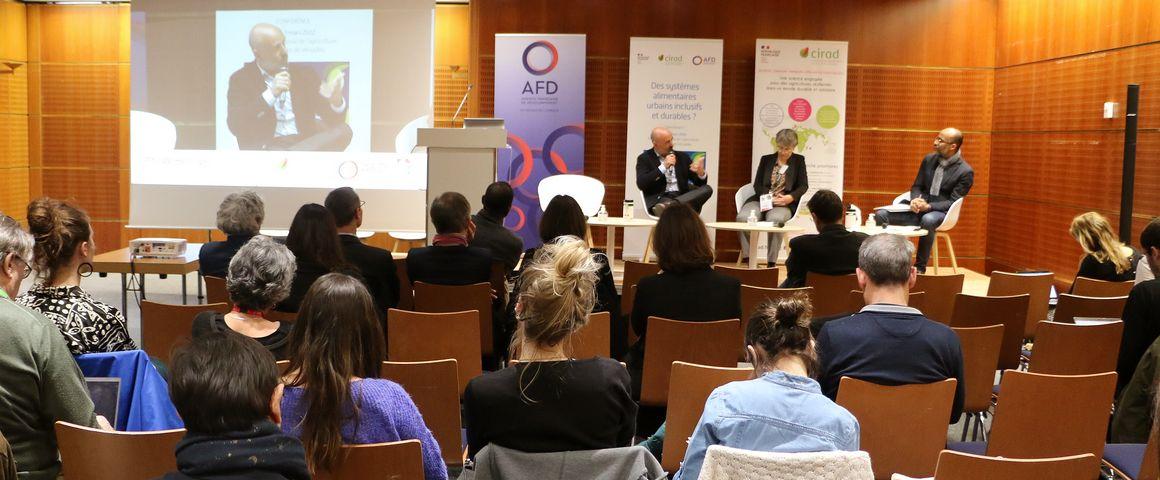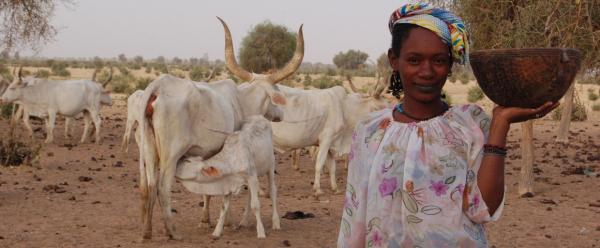Event 9 December 2025
- Home
- CIRAD news
- News
- CIRAD-AFD conference - urban food systems
Inclusive and sustainable urban food systems: identifying the challenges

The conference on “Inclusive and sustainable urban food systems?” was organized by CIRAD and AFD on Thursday 3 March 2022, at the Paris International Agricultural Show © M. Adell, CIRAD
Today, more than half of the world’s population lives in urban areas, and according to the United Nations, this figure could rise to 70% by 2050. “This growth means that food systems must be capable of meeting very high demand. But this comes with constraints in terms of transport, local market structuring, and procurement from local sectors, which requires synergies between sustainable agricultural development and urban development”, said Bertrand Walckenaer, Deputy CEO of AFD, in the introduction to the conference “Inclusive and sustainable urban food systems?”.
However, according to Damien Conaré, from the UNESCO Chair in World Food Systems, “cities also present opportunities for agriculture – wealth, infrastructure, public authorities, knowledge – which can enable urban food systems to become more resilient to the major challenges and crises they face”.
Resilience to the Covid-19 crisis, but…
In fact, “in West Africa, the food system has been more resilient than expected faced with the Covid-19 crisis”, says Philipp Heinrigs, an economist at the OECD Sahel and West Africa Club. “This is undoubtedly due to the informal sector, which is more agile and can react rapidly. But lockdowns were not feasible there, as people have to work every day to put food on the table”. This is why “lockdowns were rapidly eased in most low-income countries”, says Sandrine Dury, an economist specialising in agricultural, agri-food and rural development at CIRAD.
In Vietnam, “transport between provinces was blocked, and in some cities like Ho Chi Minh, which has no peri-urban agricultural areas, supplies were disrupted”, says Dao The Anh, Vice President of the Vietnam Academy of Agricultural Sciences (VAAS). “However, the crisis has also shown the need to rethink Vietnam’s agricultural and food policy in order to progress towards a sustainable food system”.
“In Africa, the consequences are more serious”, says Sandrine Dury. “People are certainly resilient there, but they are reducing their consumption, malnutrition is increasing and they are again facing poverty”. Moreover, “policies continue to focus on imports of traditional cash crops, to the detriment of fresh produce, and neglect very small enterprises (VSEs), despite their impact on household nutrition”, says Philipp Heinrigs. Finally, “agricultural budgets have been reduced in favour of health expenditure”, says Sandrine Dury.
Modes of financing adapted to the diversity of urban food systems
Urban food systems nevertheless need support. Consequently, “for the last 10 years, the Programme to improve the competitiveness of agropastoral family farms (ACEFA) in Cameroon has invested around 46 million euros in 7 000 projects, in both downstream and upstream production, forming a network of groups of 10 to 12 producers, which has increased productivity and is helping to feed our cities”, says Bouba Moumini, its coordinator. “The challenge now is to ensure banks create appropriate financing channels and take the helm”.
In Morocco, this support is provided by a public development bank, Crédit Agricole du Maroc. “Along with AFD, we are financing a green value chain programme, which includes credit and an investment premium, but also technical support, since we need to help producers and the agro-industry to increase their profitability, to reduce greenhouse gas emissions and to manage waste”, says Mariem Dkhil, the bank’s Director of Sustainable Development Financing. “Another example is that in 2020 we launched a programme dedicated to very small rural farms, but we have seen that some farmers are not accustomed to the formalism required by our financial organization, and need support even before making their project application”.
Public policies at the heart of urban food systems
In order to become inclusive and sustainable, urban food systems also need support from the cities themselves. “Cities do have certain tools: land, market infrastructures, school meals and street food, waste recycling, and dialogue with all city stakeholders”, says Nicolas Bricas, an expert in the socio-economics of food systems at CIRAD. “Those that want to can therefore propose sustainable, nutritious food”.
Sahondra Ratsimbazafy, mayor of Fianarantsoa in Madagascar, is committed to this approach. “With the support of AFD, we are planning to rehabilitate market infrastructures to help farmers to sell their produce without intermediaries”, she says. “But as mayors, in order to act and to make the right decisions in line with the national policy aimed at food self-sufficiency, we need to understand all components of the food system: environment, territorial management, economic development, and food and nutrition insecurity”.
In other words, the municipalities have a global approach, as confirmed by Nicolas Bricas, who points out that “cities are beginning to join forces in order to influence national agricultural policies, but also to steer research”. A desire that echoes the work undertaken in 2021 by the international School Meals Coalition, “which will assess the contribution of school meals to child well-being, but also their potential impact on local development and more sustainable food systems”, says Sylvie Avallone from Institut Agro Montpellier and scientific adviser for the project.
“This conference confirms that food systems are complex to understand, hence the need for research institutes with a global approach: food systems as well as climate, health, biodiversity and the territorial divide”, says CIRAD CEO Elisabeth Claverie de Saint Martin. “But they are also drivers of development, a change in the economic model and a transition to agroecology”.



























